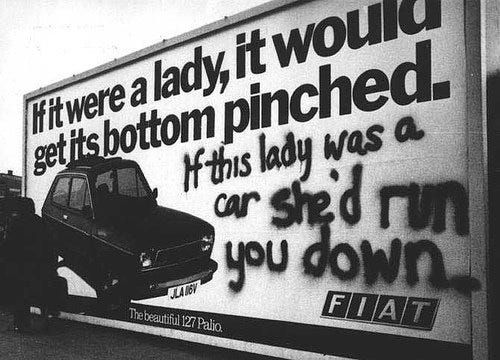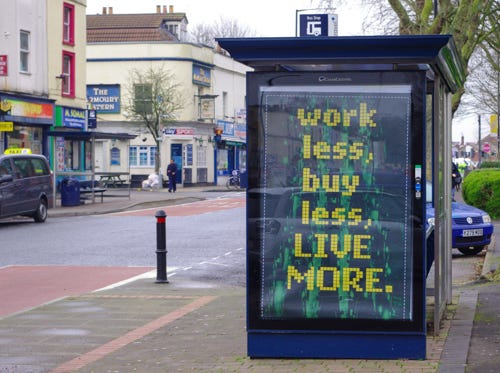In defence of ad hacking
It's fecking everywhere isn't it? Advertising on commercial TV and radio, all the way through the print media and ever present in the streets of our towns and cities. It's a relentless bombardment of messaging telling you that the only way to get some satisfaction in life is to consume and acquire goods and/or 'experiences'. For sure, we can choose to not watch or listed to commercial TV and radio and we can choose to avoid print media but the one thing we cannot avoid is being subjected to adverts everywhere we are in our town and city centres. There are various movements against the all pervading presence of advertising in our environment. Here are a couple of definitions of what various manifestations of these movements hope to achieve:
Subvertising (a portmanteau of subvert and advertising) is the practice of making spoofs or parodies of corporate and political advertisements.[1] The cultural critic Mark Dery coined the term in 1991.[2] Subvertisements are anti-ads that deflect advertising's attempts to turn the people's attention in a given direction.[3] According to author Naomi Klein, subvertising offers a way of speaking back to advertising, ‘forcing a dialogue where before there was only a declaration.’[4] They may take the form of a new image or an alteration to an existing image or icon, often in a satirical manner.
Wikipedia https://en.wikipedia.org/wiki/Subvertising
Brandalism (a portmanteau of 'brand' and 'vandalism') is an anti-advertising movement.[1] It is a form of creative activism that uses subvertising to alter and critique corporate advertising by creating parodies or spoofs to replace ads in public areas.[2] The art is typically intended to draw attention to political and social issues such as consumerism and the environment.[3] Advertisements produced by the Brandalism movement are silk screen printed artworks, and may take the form of a new image, or a satirical alteration to an existing image, icon or logo.[4] The advertisements are often pasted over billboards, or propped under the glass of roadside advertising spaces.
Wikipedia https://en.wikipedia.org/wiki/Brandalism
How much attention people actually pay to advertising is a moot point. Presumably, the advertising agencies have done the research to conclude that enough people actually do pay attention to the adverts they produce, following through to purchase the goods, services or 'experience' on offer, to justify foisting them upon us. The rest of us, most likely the majority, just have to put up with this bombardment of bullshit. Most of us just zone it out. Seriously, how many people getting home from a day out in a town or city centre can recall and describe the adverts they've seen?
Having said that, with a number of people, there are adverts that for a variety of reasons, really get on their nerves and they feel driven to take action to make their feelings known in no uncertain terms. This is the classic and entirely justified example we remember from our youth way back in the 1970s:
Yes, this kind of crap in advertising was considered to be acceptable in the 1970s! It was the slogans painted over these posters that made the advertising agencies and their clients realise that demeaning the female half of the population wasn't a good look and that some sophistication was needed. That doesn't mean to say that adverts are less crap these days - they're still crap but in more subtle and sophisticated ways.
These days, it tends to be environmental activists who are the ones hacking ads. Rather that writing a slogan on an offending poster, the tactic is to replace it with one conveying a message the activists want to convey. Here are a couple of examples of that happening in Bristol:
A legitimate, and when done right, an entertaining tactic. Given our propensity for taking the piss, we prefer the hacks that not only ridicule their target, they also make people smile and then think. Being over earnest can backfire by putting people off.
As well as the various forms of ad hacking, there are the campaigns that aim to persuade local authorities to take a tougher line in dealing with the proliferation of advertising. This takes in traditional print billboards and digital ones as well. As it's extremely difficult to hack a digital billboard in a hard to access location by a motorway, then going down the campaign route is probably the best option. Here's where one of these campaigning groups can be found:
Adblock Bristol https://adblockbristol.org.uk/about/
Adblock Bristol - Twitter https://twitter.com/AdblockBristol
When it comes to fighting back against the relentless bombardment of advertising in our towns and cities, there are no right or wrong ways of dealing with it. A diversity of strategies and tactics are to be welcomed. Sometimes, the campaigning route may be appropriate. At other times, scrawling a slogan onto an offending advert works, simply because of the rawness of the anger expressed making people stop and think. Ad hacking by replacing commercial posters with one with a message also has a place. When it comes to the removal of intrusive digital adverts in locations that impact people's quality of life, then we're fine with whatever needs to be done to redress the situation:) Just don't get caught doing it...
Sabotaging and/or hacking ads is one way of fighting back against a system that puts a market value on every aspect of our existence. That includes the streets of our towns and cities which the corporations seem to think are theirs to do what they want with. In the defence of the commons which includes our streets, hacking and taking out adverts and reclaiming space from the corporations is a legitimate tactic. It's a statement of intent about who the public realm should belong to, which is us, the public, not the corporations.
Given the increasing restrictions on protests, hacking adverts is one kind of action we can hopefully get away with because, unless people are being really careless, it's not the kind of action that inconveniences the public in any way. If you're doing it while wearing hi-vis jackets, it's highly unlikely that anyone will take any notice of you! Operating in plain sight and all that... Mind you, that could change if the corporations and advertising agencies start whingeing. That can be dealt with as and when it comes. Right, we'd better stop here before we get done for incitement...








